Part IV Strengthening Partnership with Diverse Actors and Disseminating Information on Development Cooperation
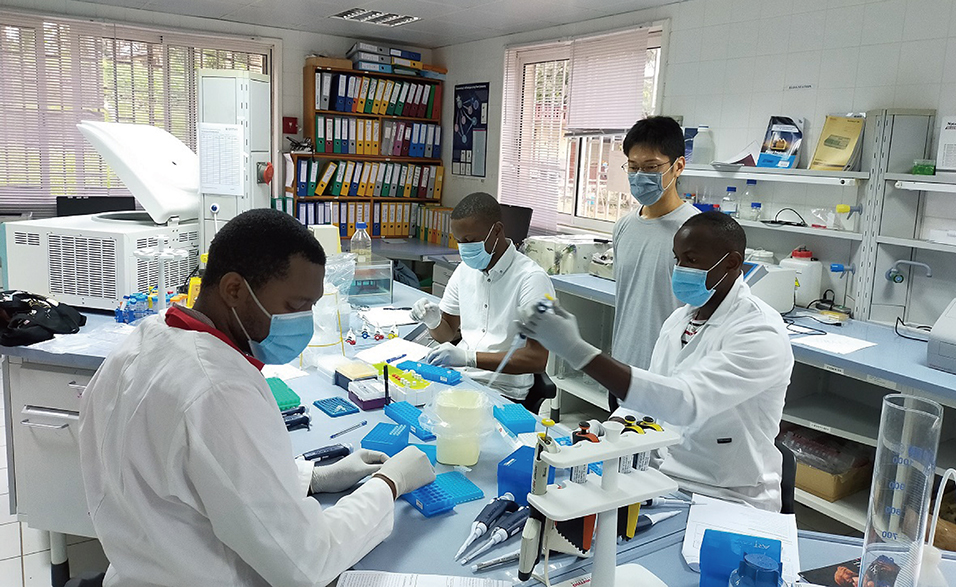
Conducting training on COVID-19 under the “Project for Establishment of Laboratory Surveillance System for Viral Diseases of Public Health Concern” (SATREPS) implemented in Gabon by Nagasaki University (Photo: JICA)
1 Efforts for Strengthening Partnerships with Diverse Actors
(1) Partnership with Private Companies
The Government of Japan strives to effectively utilize the excellent technologies, knowledge, experience, and funds of Japanese private companies so that the collective strengths of Japanese companies can be further demonstrated in ODA projects by the Ministry of Foreign Affairs (MOFA) and JICA. In addition, Japan promotes partnerships with private sector investment projects through the sharing of roles between public and private sectors. For example, the private sector’s knowledge and know-how can be incorporated from the stage of ODA project formation, or basic infrastructure can be covered by ODA while investments, operation, maintenance, and management are carried out by the private sector. Japan will enhance development outcomes by strengthening collaboration with private sectors and carrying out projects more efficiently and effectively.
A. Grant Aid
The Government of Japan supports the overseas expansion of Japanese companies by providing mainly their products to developing countries based on the requests and development needs of developing country governments. In 2021, for example, products of Japanese companies were provided to Cambodian organizations that have conducted research and human resources development through collaboration between Japanese and Cambodian industry and academia. This led to the development of highly-skilled engineers in Cambodia as well as the strengthening of the foundation for Japanese companies to expand their business.
B. Improving Japan’s ODA Loans Utilizing Japan’s Strengths
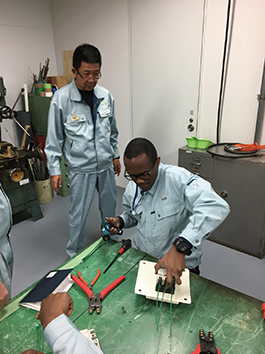
A Rwandan exchange student receiving training at OTOWA ELECTRIC CO., LTD. The company aims to spread lightning protection technology in the country in cooperation with the Government of Rwanda through the SDGs Business Supporting Surveys. (Photo: OTOWA ELECTRIC CO., LTD./JICA)
The Government of Japan has improved its aid schemes including the introduction of the Special Terms for Economic Partnership (STEP), expansion of the scope of application, and the lowering of interest rates to promote “Visible Japanese Development Cooperation” through the utilization and transfer of Japan’s advanced technologies and know-how to developing countries. In addition, it has also introduced the Equity Back Finance (EBF) loan Note 1 and the Viability Gap Funding (VGF) loan Note 2 based on the improvement and application of measures by the recipient governments to promote the steady formulation and implementation of infrastructure development projects by utilizing Public-Private Partnerships (PPPs) participated by Japanese companies. In recent years, there are increasing number of orders of ODA loan projects by Japanese companies, which support their overseas business expansion.
In addition, as follow-up measures for “Partnerships for Quality Infrastructure,” Note 3 the Government of Japan has been making efforts to improve its ODA loan and Private Sector Investment Finance (PSIF) by speeding up Japan’s ODA loan procedures and creating new ODA loan options. For example, it has reduced the period necessary for Government-related procedures for Japan’s ODA loans that normally require three years to approximately one and a half years for important projects. It has also introduced ODA loans with currency conversion option to middle- to upper-middle-income countries on the condition that JICA’s financial grounds are ensured, and established dollar-denominated ODA loans and Japan’s ODA loans with Preferential Terms for High Specification. Note 4 Furthermore, in the “Expanded Partnership for Quality Infrastructure,” Note 5 Japan announced that it would further accelerate ODA loan procedures, decided to reduce the period between the initiation of the feasibility study (F/S) and commencement of the construction work to one and a half years at the fastest, and increased “the visibility” of the project period. Japan will strive to improve the ODA loan so that projects can be formulated and developed in an expeditious manner.
Egypt
Japan Overseas Cooperation Volunteers (Private-Sector Partnership)*1
(January 2019 – January 2020) Mr. NIINOBE Yuta (Panasonic Corporation)
In Egypt, 95% of the entire population is concentrated in the Nile River Basin, which runs from south to north through the country. Among the basin zone, the central and southern areas of Egypt are poor and there is limited access to hospitals for the residents. In order to provide medical services to this region efficiently, an Egyptian philanthropic organization is working on a floating boat hospital project whereby it operates a hospital boat along the Nile River and conducts medical examinations of children living along the river. It has provided medical services free of charge to a total of more than 66,000 children to date.
I participated in the project implemented by the philanthropic organization as a Japan Overseas Cooperation Volunteer (Private-Sector Partnership), while retaining the status of an employee of my company, Panasonic Corporation. I was in charge of overall operational control for running the boat hospital and the marketing to increase the number of supporters of the project.
Utilizing my prior work experience at a Japanese manufacturing company, I have improved the efficiency of the medical treatment system by the development and management of medical facilities, establishment of a patient information data system, inventory management of medicines, and the formation of waiting lines. As a result, the number of patients who could be examined on the boat increased from 500 to 1,500 a day after my arrival. Furthermore, regarding marketing, I was involved in the setting up of social media pages, managing relations with companies sponsoring operations, and the creation of PR materials. In particular, thanks to our proactive promotional activities through social media, and as a result, I gained more than 500 new supporters during my tenure on the project.
After I resumed my work at the company, I took up a position in the Middle East region and have taken charge of marketing in the area so that I can return to society what I have gained as a JOCV, such as the on-site management skills, marketing skills, Arabic skills, and understanding of the local community. I am working with the goals of invigorating Japanese industry overall and further enhancing Japan’s brand strength by promoting the products and value provided by Japanese manufacturing companies to the world.
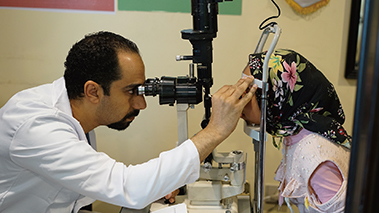
Volunteer ophthalmologist examining a child on the boat (Photo: JICA)
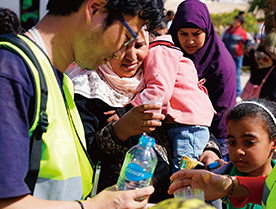
Mr. Niinobe providing water to people waiting for a medical examination in over 40-degree heat, in order to prevent heatstroke (Photo: JICA)
*1 See also “Japan Overseas Cooperation Volunteers (Private-Sector Partnership)”.
C. Proposal-based Public-Private Partnership Support Schemes
In order to actively utilize opinions and proposals from private companies, the Government of Japan and JICA also promote public-private partnership support schemes based on private sector proposals, such as SDGs Business Supporting Surveys and Preparatory Surveys for Private-Sector Investment Finance.
■SDGs Business Supporting Surveys
SDGs Business Supporting Surveys* is a program that aims to solve problems in the field through business and to promote collaboration with a wide range of partners by incorporating ideas from private companies based on their creativity and originality. In FY2021, public announcements were made twice on the JICA website, and JICA adopted proposals submitted by companies based on their content.
In 2021, a total of 86 projects in 29 countries (SME Partnership Promotion Survey: 19 projects; SDGs Business Model Formulation Survey with the Private Sector: 40 projects for the “SME Support Type” and 11 projects for the “SDGs Business Support Type”; SDGs Business Verification Survey with the Private Sector: eight projects for the “SME Support Type” and eight projects for the “SDGs Business Support Type”) were adopted under this program (see also “Master Techniques from Japan to the World 1.” For more information about the program’s framework, target areas and countries, and other details, see the JICA website). Note 6
■Preparatory Surveys for Private-Sector Investment Finance
In recent years, there has been a growing trend to improve infrastructure in developing countries through public-private partnership and to promote economic and social development through private-sector projects. JICA implements its Preparatory Surveys for Private-Sector Investment Finance (PSIF) to formulate projects that utilize private-sector funds with the provision of support through Private-Sector Investment Finance in mind. Through PSIF, JICA supports feasibility surveys (F/S) for the formulation of business plans by calling for proposals widely from private companies that plans to participate in projects in developing countries (for more information about the program’s framework, target areas and countries, and other details, see the JICA website). Note 7 In 2021, four projects were adopted in Asia and Africa.
■Japan Overseas Cooperation Volunteers (Private-Sector Partnership)
As Japan Overseas Cooperation Volunteers (Private-Sector Partnership), established in 2012, 120 volunteers have been dispatched to 38 countries thus far and actively support the overseas expansion of companies (see also “Project Introduction Column”).
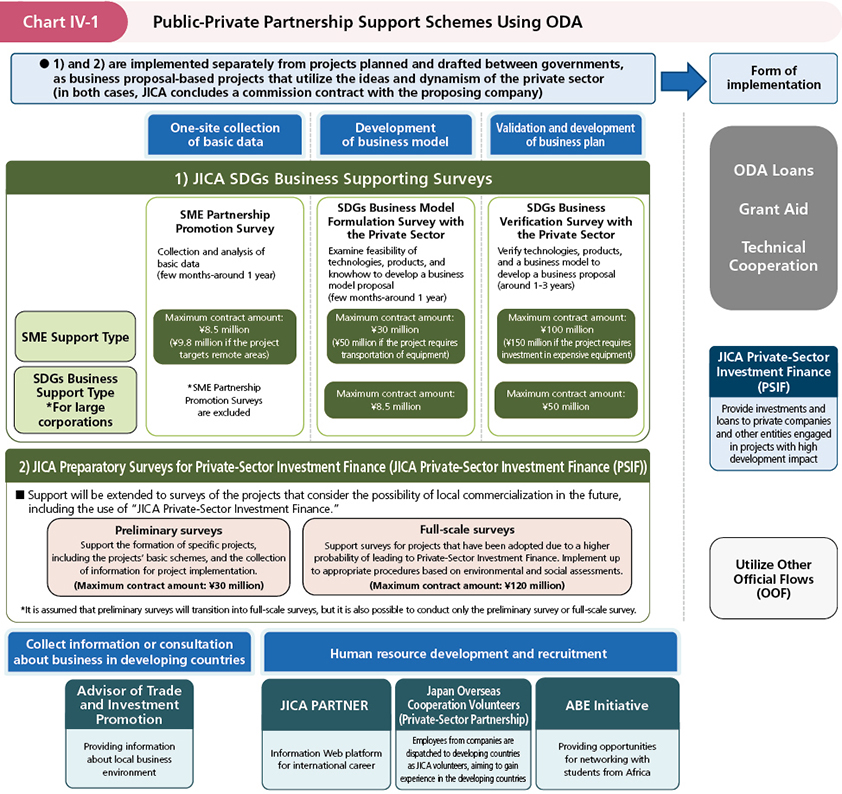
D. Private-Sector Investment Finance (PSIF)
PSIF Note 8 refers to a type of ODA financing scheme in which JICA provides necessary funds to private companies carrying out projects that are considered highly effective from a development perspective in developing countries in cases when they cannot receive sufficient funds from private financial institutions (see also “Stories from the Field 7”). JICA signed 47 investment and loan contracts in total by the end of FY2020, and many Japanese companies have participated in them (for more information about the program’s framework, target areas, conditions, and other details, see the JICA website). Note 9 A recent good example is the international airport development project in Palau, for which a loan contract was signed in 2019. In Palau, where an ODA loan project was not able to be implemented due to the heavy debt burden of the government, PSIF enabled cooperation as the first public-private partnership (PPP) project to leverage Japan’s quality infrastructure development. In addition, Japan actively supports women entrepreneurs and micro, small, and medium-sized enterprises that have had difficulty accessing finance due to the impact of COVID-19, through the Initiative on Overseas Loans and Investment for ASEAN and other efforts (see also “Support for Southeast Asia” for Initiative on Overseas Loans and Investments for ASEAN).
The Government of Japan continuously reviews and improves its PSIF system and in 2021, the effectiveness of the process of the relevant ministries and agencies as well as JICA has been monitored based on the “Guidelines for Selecting JICA Private-Sector Investment Finance Projects,” which were revised in November 2020.
Japan’s development cooperation is carried out in partnership with diverse actors. When implementing development cooperation, it is important for the Government to strengthen collaboration between JICA and other agencies responsible for handling official funds such as Japan Bank for International Cooperation (JBIC), Nippon Export and Investment Insurance (NEXI), the Japan Overseas Infrastructure Investment Corporation for Transport and Urban Development (JOIN), and the Fund Corporation for the Overseas Development of Japan’s ICT and Postal Services (JICT) as well as to serve as a catalyst for mobilizing and assembling a wide range of resources, including the private sector.
In addition, international organizations, such as the United Nation Development Programme (UNDP) and the United Nations Children’s Fund (UNICEF), support inclusive businesses* by Japanese companies, utilizing the organizations’ extensive experience and expertise in developing countries.
Glossary
- SDGs Business Supporting Surveys
- The program, which is based on proposals from private companies, assists in matching the needs of developing countries with the advanced products and technologies, etc., possessed by private-sector companies, and supports the development of businesses that contribute to solving problems in these countries. The program implements the Small and Medium-sized Enterprise (SME) Partnership Promotion Survey, the SDGs Business Model Formulation Survey with the Private Sector, and the SDGs Business Verification Survey with the Private Sector as support options tailored to various project stages. The program has two categories: SME Support Type and SDGs Business Support Type. The former not only supports the expansion of SMEs’ businesses abroad, but is also expected to invigorate the Japanese economy and local communities (see also Chart IV-1).
- Inclusive business
- Inclusive business is a generic term for a business model advocated by the UN and the World Bank Group as an effective way to achieve inclusive market growth and development. It includes sustainable Base of the Economic Pyramid (BOP) businesses that resolve social challenges.
- Note 1: EBF (Equity Back Finance) loan provides a yen loan to the developing country’s part of the investment of the Special Purpose Company (SPC), which takes the lead in public projects in the developing country. It is restricted to PPP infrastructure projects, wherein the recipient country governments or their nationally-owned companies and others make the investment, and the Japanese companies participate as a business operating body.
- Note 2: Viability Gap Funding (VGF) loan is the loan against VGF which the developing country provides to the SPC in order to secure profitability expected by SPC when Japanese companies invest in the PPP infrastructure projects by the developing country in principle.
- Note 3: Announced in 2015, the Partnership for Quality Infrastructure has the following pillars: expansion and acceleration of assistance through the full mobilization of Japan’s economic cooperation tools, collaboration between Japan and ADB, expansion of the supply of funding for projects with relatively high risk profiles by such means as enhancement of the function of JBIC, and promoting “Quality Infrastructure Investment” as an international standard.
- Note 4: Concessional loans provided to projects recognized as contributing to the promotion of “Quality Infrastructure” based on the “G7 Ise-Shima Principles for Promoting Quality Infrastructure Investment” compiled at the G7 Ise-Shima Summit in 2016.
- Note 5: The Expanded Partnerships for Quality Infrastructure was announced at the G7 Ise-Shima Summit held in 2016. It includes Japan’s commitment to provide approximately $200 billion funds in the following five years for infrastructure projects in the world including Asia. At the same time, it includes further system reforms, strengthening the structure of related institutions including JICA, as well as securing financial foundation.
- Note 6: SDGs Business Supporting Surveys: https://www.jica.go.jp/priv_partner/activities/sme/index.html (in Japanese only)
- Note 7: Preparatory Survey for Private-Sector Investment Finance (formerly Preparatory Survey for PPP Infrastructure Project):
https://www.jica.go.jp/priv_partner/activities/psiffs/index.html (in Japanese only) - Note 8: PSIF assists in the following fields for funding: (i) infrastructure development and accelerating growth, (ii) SDGs and poverty reduction, and (iii) measures against climate change.
- Note 9: Overview of PSIF: https://www.jica.go.jp/activities/schemes/finance_co/loan/index.html (in Japanese only)
